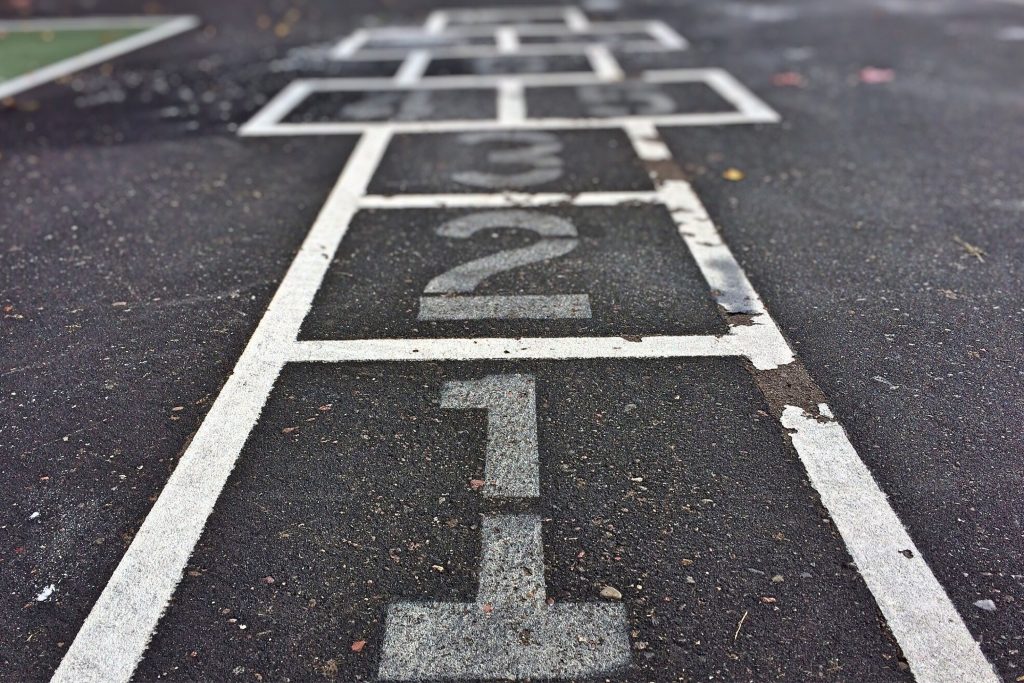Russian Outdoor Games for Kids Posted by Maria on Sep 3, 2019 in Culture, Russian life, Vocabulary
Have you ever wondered what kind of outdoor activities Russian children engage in? The games (и́гры) in this post are not unique to Russia and are known in the entire post-Soviet area—and beyond.
Кла́ссики
This one’s a classic (pun intended)! Кла́ссики is the Russian name for hopscotch. I imagine most people are familiar with it, but here’s a quick recap. The game consists of drawing a grid of 10 adjacent rectangles (прямоуго́льники) in a specific configuration. Apparently, it is played by kicking/throwing a small object into each subsequent rectangle an jumping into the area with the object on one foot without touching the boundaries. I say “apparently” because I don’t recall having to throw anything when I was little—we would only jump from one square to the next. If you played this in your childhood, how did you play?
Мо́ре волну́ется
“Мо́ре волну́ется” loosely translates as “the sea is choppy.” The facilitator (веду́щий) recites the following lines:
Мо́ре волну́ется — раз,
Мо́ре волну́ется — два,
Мо́ре волну́ется — три,
Морска́я фигу́ра замри́!
This means something like “The sea’s choppy — one, the sea’s choppy — two, the sea’s choppy — three, sea figure freeze!” As they say the first three lines, all other participants make graceful movements like they’re sea creatures. As they finish the last line, the players (игроки́) need to freeze. The facilitator walks around and picks the prettiest “sea figure.” Whoever laughs or moves first in the meantime, loses.
Пря́тки
Пря́тки is good old hide and seek. The game starts with one player, called водя́щий (“it”) closing their eyes and counting to a certain number (often 100). The rest of the players need to find a place to hide (пря́таться, hence the name of the game). Then the “seeker” says something like «раз-два-три-четы́ре-пять, я иду иска́ть» (“1, 2, 3, 4, 5, I’m going to look”) or «кто не спря́тался, я не винова́т» (“Whoever hasn’t hidden is not my fault”) and goes to look for the other participants. When they find a person, both “it” and the hiding person need to run back to and touch the “home zone.” The last player hiding who fails to do that becomes “it” in the next round.
Again, variations are possible. I don’t remember having to run to the home zone—rather, when you discovered, you were out. How did you play?
Са́лки
You know how Russian has relatively little dialectal variation in its vocabulary? The game of tag is a notable exception to that trend. Depending on the part may be called са́лки, са́лочки, баши́, горе́лки, си́фа and tens of other names! One person, “it,” has to “tag” (known as осали́ть, заголи́ть, and under many other regional names) one of the other players by touching that player. The other players’ goal is to run away and avoid being tagged. If a person is tagged, they become “it.”
Have you played or seen any of these games? What variations do you know?

Build vocabulary, practice pronunciation, and more with Transparent Language Online. Available anytime, anywhere, on any device.






Comments:
Enrica:
Dear Maria,
It is always nice to think back about childhood, so thank you to made me re-thinking to these memories.
I wanted to answer about the variations (I’m from the North of Italy, Piemonte, so I’ll speak about this region): for классики alse me and my friends never threw anything, but I remeber once my uncle was showing us how to play and made us throw a small stone that had to fell in the rectangle we had to reach, otherwise we could not move.
About море волнуетяс there’s nothing like that from what I know, but we have a similar game where you have to freeze when the facilitator turns after counting till three. If you move while he looks at you, you go back to the start line. The goal is to reach the wall where the facilitator stays, touch it and become the facilitator.
About прятки we use to play with the rule that, even when you are seen, the “it” has to catch you before you reach “home”, otherwise you are safe. That’s why when we were a lot there were many “it” trying to catch us.
Thanks for reading, and for your good job!
Have a nice day,
Enrica
Maria:
@Enrica Erica, interesting! So it does sound like maybe the hopscotch where you throw something is an earlier/more traditional version because I didn’t do that in my childhood, either.
Glad you enjoyed it and hope to see you again on this blog!